|
|
|
Sort Order |
|
|
|
Items / Page
|
|
|
|
|
|
|
| Srl | Item |
| 1 |
ID:
150513


|
|
|
|
|
| Summary/Abstract |
Native Americans have been structurally excluded from the discipline of political science in the continental United States, as has Native epistemology and political issues. I analyze the reasons for these erasures and elisions, noting the combined effects of rejecting Native scholars, political issues, analysis, and texts. I describe how these arise from presumptions inherent to the disciplinary practices of U.S. political science, and suggest a set of alternative formulations that could expand our understanding of politics, including attention to other forms of law, constitutions, relationships to the environment, sovereignty, collective decision-making, U.S. history, and majoritarianism.
|
|
|
|
|
|
|
|
|
|
|
|
|
|
|
|
| 2 |
ID:
150512
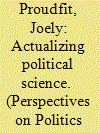

|
|
|
|
|
| Summary/Abstract |
Native Americans have been structurally excluded from the discipline of political science in the continental United States, as has Native epistemology and political issues. I analyze the reasons for these erasures and elisions, noting the combined effects of rejecting Native scholars, political issues, analysis, and texts. I describe how these arise from presumptions inherent to the disciplinary practices of U.S. political science, and suggest a set of alternative formulations that could expand our understanding of politics, including attention to other forms of law, constitutions, relationships to the environment, sovereignty, collective decision-making, U.S. history, and majoritarianism.
|
|
|
|
|
|
|
|
|
|
|
|
|
|
|
|
| 3 |
ID:
150517


|
|
|
|
|
| Summary/Abstract |
I extensively agree with Lieberman’s main argument and especially with his recommendations to graduate students and journal editors, which come at a critical time for our discipline’s development and future relevance. However, I depart from Lieberman on two issues. First, I argue that the research cycle is circular, and not teleological as Lieberman implies. For instance, randomized control trial (RCT) studies could be the start (and not the end) of a research cycle that leads to more descriptive and qualitative analysis in order to improve our understanding of causality. Second, I believe that the size of effects in RCT studies does matter, among other reasons because small effects might be symptoms of defective conceptualization of the main research problem.
|
|
|
|
|
|
|
|
|
|
|
|
|
|
|
|
| 4 |
ID:
150515


|
|
|
|
|
| Summary/Abstract |
In sciences such as biomedicine, researchers and journal editors are well aware that progress in answering difficult questions generally requires movement through a research cycle: Research on a topic or problem progresses from pure description, through correlational analyses and natural experiments, to phased randomized controlled trials (RCTs). In biomedical research all of these research activities are valued and find publication outlets in major journals. In political science, however, a growing emphasis on valid causal inference has led to the suppression of work early in the research cycle. The result of a potentially myopic emphasis on just one aspect of the cycle reduces incentives for discovery of new types of political phenomena, and more careful, efficient, transparent, and ethical research practices. Political science should recognize the significance of the research cycle and develop distinct criteria to evaluate work at each of its stages.
|
|
|
|
|
|
|
|
|
|
|
|
|
|
|
|
| 5 |
ID:
150518
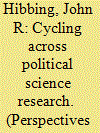

|
|
|
|
|
| Summary/Abstract |
I extensively agree with Lieberman’s main argument and especially with his recommendations to graduate students and journal editors, which come at a critical time for our discipline’s development and future relevance. However, I depart from Lieberman on two issues. First, I argue that the research cycle is circular, and not teleological as Lieberman implies. For instance, randomized control trial (RCT) studies could be the start (and not the end) of a research cycle that leads to more descriptive and qualitative analysis in order to improve our understanding of causality. Second, I believe that the size of effects in RCT studies does matter, among other reasons because small effects might be symptoms of defective conceptualization of the main research problem.
|
|
|
|
|
|
|
|
|
|
|
|
|
|
|
|
| 6 |
ID:
150526


|
|
|
|
|
| Summary/Abstract |
In White World Order, Black Power Politics: The Birth of American International Relations, Robert Vitalis presents a critical disciplinary history of the field of international relations, and the discipline of political science more broadly. Vitalis argues that the interconnections between imperialism and racism were “constitutive” of international relations scholarship in the U.S. since the turn of the 20th century, and that the perspectives of a generation of African-American scholars that included W. E. B. Dubois, Alain Locke, and Ralph Bunche were equally constitutive of this scholarship—by virtue of the way the emerging discipline sought to marginalize these scholars. In developing this argument, Vitalis raises questions about the construction of knowledge and the racial foundations of American political development. These issues lie at the heart of U.S. political science, and so we have invited a range of political scientists to comment on the book and its implications for our discipline.
|
|
|
|
|
|
|
|
|
|
|
|
|
|
|
|
| 7 |
ID:
150527
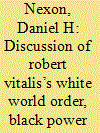

|
|
|
|
|
| Summary/Abstract |
In White World Order, Black Power Politics: The Birth of American International Relations, Robert Vitalis presents a critical disciplinary history of the field of international relations, and the discipline of political science more broadly. Vitalis argues that the interconnections between imperialism and racism were “constitutive” of international relations scholarship in the U.S. since the turn of the 20th century, and that the perspectives of a generation of African-American scholars that included W. E. B. Dubois, Alain Locke, and Ralph Bunche were equally constitutive of this scholarship—by virtue of the way the emerging discipline sought to marginalize these scholars. In developing this argument, Vitalis raises questions about the construction of knowledge and the racial foundations of American political development. These issues lie at the heart of U.S. political science, and so we have invited a range of political scientists to comment on the book and its implications for our discipline.
|
|
|
|
|
|
|
|
|
|
|
|
|
|
|
|
| 8 |
ID:
150528
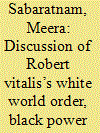

|
|
|
|
|
| Summary/Abstract |
In White World Order, Black Power Politics: The Birth of American International Relations, Robert Vitalis presents a critical disciplinary history of the field of international relations, and the discipline of political science more broadly. Vitalis argues that the interconnections between imperialism and racism were “constitutive” of international relations scholarship in the U.S. since the turn of the 20th century, and that the perspectives of a generation of African-American scholars that included W. E. B. Dubois, Alain Locke, and Ralph Bunche were equally constitutive of this scholarship—by virtue of the way the emerging discipline sought to marginalize these scholars. In developing this argument, Vitalis raises questions about the construction of knowledge and the racial foundations of American political development. These issues lie at the heart of U.S. political science, and so we have invited a range of political scientists to comment on the book and its implications for our discipline.
|
|
|
|
|
|
|
|
|
|
|
|
|
|
|
|
| 9 |
ID:
150525


|
|
|
|
|
| Summary/Abstract |
In White World Order, Black Power Politics: The Birth of American International Relations, Robert Vitalis presents a critical disciplinary history of the field of international relations, and the discipline of political science more broadly. Vitalis argues that the interconnections between imperialism and racism were “constitutive” of international relations scholarship in the U.S. since the turn of the 20th century, and that the perspectives of a generation of African-American scholars that included W. E. B. Dubois, Alain Locke, and Ralph Bunche were equally constitutive of this scholarship—by virtue of the way the emerging discipline sought to marginalize these scholars. In developing this argument, Vitalis raises questions about the construction of knowledge and the racial foundations of American political development. These issues lie at the heart of U.S. political science, and so we have invited a range of political scientists to comment on the book and its implications for our discipline.
|
|
|
|
|
|
|
|
|
|
|
|
|
|
|
|
| 10 |
ID:
150500
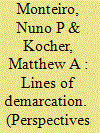

|
|
|
|
|
| Summary/Abstract |
Qualitative historical knowledge is essential for validating natural experiments. Specifically, the validity of a natural experiment depends on the historical processes of treatment assignment and administration, including broader macro-historical dynamics. But if validating a natural experiment requires trust in the ability of qualitative evidence to establish the causal processes through which the data were generated, there is no good reason for natural experiments to be considered epistemically superior to historical research. To the contrary, the epistemic status of natural experiments is on a par with that of the historical research on which their validation depends. They are two modes of social-scientific explanation, each with its own pros and cons; neither is privileged. We illustrate this argument by re-examining an important recent contribution to the literature on violent conflict: Ferwerda and Miller’s 2014 natural experiment estimating the causal effect of the German decision to devolve authority to the Vichy French government on violent resistance during World War II.
|
|
|
|
|
|
|
|
|
|
|
|
|
|
|
|
| 11 |
ID:
150511
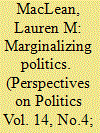

|
|
|
|
|
| Summary/Abstract |
Native Americans have been structurally excluded from the discipline of political science in the continental United States, as has Native epistemology and political issues. I analyze the reasons for these erasures and elisions, noting the combined effects of rejecting Native scholars, political issues, analysis, and texts. I describe how these arise from presumptions inherent to the disciplinary practices of U.S. political science, and suggest a set of alternative formulations that could expand our understanding of politics, including attention to other forms of law, constitutions, relationships to the environment, sovereignty, collective decision-making, U.S. history, and majoritarianism.
|
|
|
|
|
|
|
|
|
|
|
|
|
|
|
|
| 12 |
ID:
150501
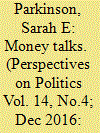

|
|
|
|
|
| Summary/Abstract |
Scholarship on militant organizations and rebel movements emphasizes the effects of fragmentation and disunity on military and political outcomes. Yet this scholarship’s focus on formal, durable, and externally observable aspects of organizational structure omits the social practices that constitute, reinforce, and reproduce intra-group schisms. How do intra-organizational divisions calcify into permanent cleavages? What processes reproduce factions over time? Using the case of Fatah in Lebanon, I argue that informal discursive practices—e.g., gossip, jokes, complaints, storytelling—contribute to the maintenance and reproduction of intra-organizational factions. Specifically, I focus on how networks of meaning-laden, money-centric discourse structure relations among militants who identify as being “Old Fatah.” I demonstrate that while these practices frequently originate in the organizational realm, cadres subsequently reproduce them within kinship, marriage, and friendship networks. This “money talk” between age cohorts within the quotidian realm connects younger members of Fatah to older cadres through collective practices and conceptions of organizational membership. These practices both exemplify an intra-organizational schism and constitute, in part, the faction called Old Fatah. Examining how symbolic practice comprises social structure thus provides important insight into the politics of organizations such as militant groups, social movements, and political parties.
|
|
|
|
|
|
|
|
|
|
|
|
|
|
|
|
| 13 |
ID:
150519


|
|
|
|
|
| Summary/Abstract |
This response to Prof. Lieberman’s essay questions its analogy between “biomedical research” and the academic discipline of political science. Focused on the disanalogy of scope and scale between the two, it takes issue not with the “criterial framework” he offers, but with the quality of argumentation that leads us there. Supplementing the essay’s impressionistic account of editorial practice with evidence drawn from the New England Journal of Medicine and the publishing history of APSA journals since the 1960s, I suggest that the issue here is not simply editorial virtue and professional norms, but differences in the material and institutional bases of the journals’ alternative publication models.
|
|
|
|
|
|
|
|
|
|
|
|
|
|
|
|
| 14 |
ID:
150521


|
|
|
|
|
| Summary/Abstract |
Sometimes political theorists like to imagine that they are lonely humanists misplaced in social science departments. In fact, political theory was created as part of a political science composed of both humanistic and social-scientific elements. Rather than trying to locate political theory somewhere between the humanities and the social sciences, we should instead dismantle the boundary between the two and create a unified discipline of questioning that embraces both kinds of inquiry.
|
|
|
|
|
|
|
|
|
|
|
|
|
|
|
|
| 15 |
ID:
150498
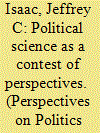

|
|
|
| 16 |
ID:
150522
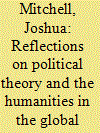

|
|
|
|
|
| Summary/Abstract |
Has the uneasy marriage between political theory and political science reached the point where a divorce is now necessary? I consider here the gradual decline of political theory after its post-World War II heyday and its growing self-enclosure in the face of global events that call out for the deeper sort of inquiry that political theory can offer. Drawing on examples from both the Middle East and America, I turn next to a number of institutional considerations that help us understand why this has happened. These institutional challenges pale, however, next to the challenge the hermeneutics of suspicion poses in the twenty-first century to a world increasingly exhausted by the liberal and anti-modern tropes, and in need of constructive understandings of how to go forward. I conclude with the suggestion that political theory and the humanities are better situated within a domain called comparative canonical inquiry.
|
|
|
|
|
|
|
|
|
|
|
|
|
|
|
|
| 17 |
ID:
150516


|
|
|
|
|
| Summary/Abstract |
In sciences such as biomedicine, researchers and journal editors are well aware that progress in answering difficult questions generally requires movement through a research cycle: Research on a topic or problem progresses from pure description, through correlational analyses and natural experiments, to phased randomized controlled trials (RCTs). In biomedical research all of these research activities are valued and find publication outlets in major journals. In political science, however, a growing emphasis on valid causal inference has led to the suppression of work early in the research cycle. The result of a potentially myopic emphasis on just one aspect of the cycle reduces incentives for discovery of new types of political phenomena, and more careful, efficient, transparent, and ethical research practices. Political science should recognize the significance of the research cycle and develop distinct criteria to evaluate work at each of its stages.
|
|
|
|
|
|
|
|
|
|
|
|
|
|
|
|
| 18 |
ID:
150520


|
|
|
|
|
| Summary/Abstract |
This response to Prof. Lieberman’s essay questions its analogy between “biomedical research” and the academic discipline of political science. Focused on the disanalogy of scope and scale between the two, it takes issue not with the “criterial framework” he offers, but with the quality of argumentation that leads us there. Supplementing the essay’s impressionistic account of editorial practice with evidence drawn from the New England Journal of Medicine and the publishing history of APSA journals since the 1960s, I suggest that the issue here is not simply editorial virtue and professional norms, but differences in the material and institutional bases of the journals’ alternative publication models.
|
|
|
|
|
|
|
|
|
|
|
|
|
|
|
|
| 19 |
ID:
150514


|
|
|
|
|
| Summary/Abstract |
Native Americans have been structurally excluded from the discipline of political science in the continental United States, as has Native epistemology and political issues. I analyze the reasons for these erasures and elisions, noting the combined effects of rejecting Native scholars, political issues, analysis, and texts. I describe how these arise from presumptions inherent to the disciplinary practices of U.S. political science, and suggest a set of alternative formulations that could expand our understanding of politics, including attention to other forms of law, constitutions, relationships to the environment, sovereignty, collective decision-making, U.S. history, and majoritarianism.
|
|
|
|
|
|
|
|
|
|
|
|
|
|
|
|
| 20 |
ID:
150509
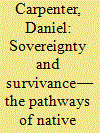

|
|
|
|
|
| Summary/Abstract |
Native Americans have been structurally excluded from the discipline of political science in the continental United States, as has Native epistemology and political issues. I analyze the reasons for these erasures and elisions, noting the combined effects of rejecting Native scholars, political issues, analysis, and texts. I describe how these arise from presumptions inherent to the disciplinary practices of U.S. political science, and suggest a set of alternative formulations that could expand our understanding of politics, including attention to other forms of law, constitutions, relationships to the environment, sovereignty, collective decision-making, U.S. history, and majoritarianism.
|
|
|
|
|
|
|
|
|
|
|
|
|
|
|
|
|
|
|
|
|